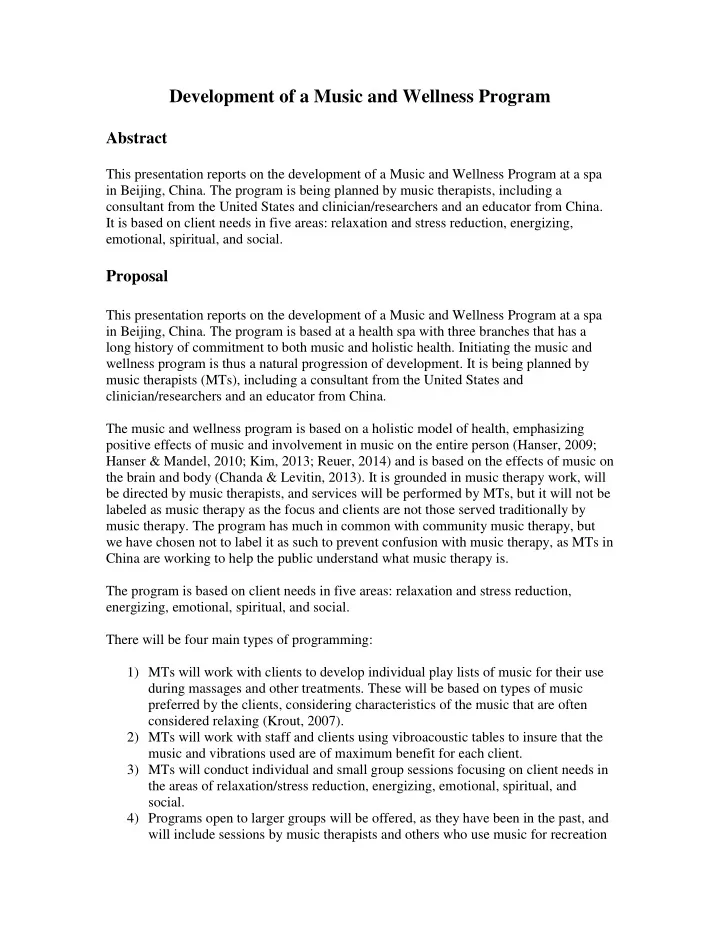

Development of a Music and Wellness Program Abstract This presentation reports on the development of a Music and Wellness Program at a spa in Beijing, China. The program is being planned by music therapists, including a consultant from the United States and clinician/researchers and an educator from China. It is based on client needs in five areas: relaxation and stress reduction, energizing, emotional, spiritual, and social. Proposal This presentation reports on the development of a Music and Wellness Program at a spa in Beijing, China. The program is based at a health spa with three branches that has a long history of commitment to both music and holistic health. Initiating the music and wellness program is thus a natural progression of development. It is being planned by music therapists (MTs), including a consultant from the United States and clinician/researchers and an educator from China. The music and wellness program is based on a holistic model of health, emphasizing positive effects of music and involvement in music on the entire person (Hanser, 2009; Hanser & Mandel, 2010; Kim, 2013; Reuer, 2014) and is based on the effects of music on the brain and body (Chanda & Levitin, 2013). It is grounded in music therapy work, will be directed by music therapists, and services will be performed by MTs, but it will not be labeled as music therapy as the focus and clients are not those served traditionally by music therapy. The program has much in common with community music therapy, but we have chosen not to label it as such to prevent confusion with music therapy, as MTs in China are working to help the public understand what music therapy is. The program is based on client needs in five areas: relaxation and stress reduction, energizing, emotional, spiritual, and social. There will be four main types of programming: 1) MTs will work with clients to develop individual play lists of music for their use during massages and other treatments. These will be based on types of music preferred by the clients, considering characteristics of the music that are often considered relaxing (Krout, 2007). 2) MTs will work with staff and clients using vibroacoustic tables to insure that the music and vibrations used are of maximum benefit for each client. 3) MTs will conduct individual and small group sessions focusing on client needs in the areas of relaxation/stress reduction, energizing, emotional, spiritual, and social. 4) Programs open to larger groups will be offered, as they have been in the past, and will include sessions by music therapists and others who use music for recreation
and wellness, providing positive benefits and also introduce clients to possibilities of using music in wellness. References Chanda, M. L., & Levitin, D. J. (2013). The neurochemistry of music. Trends in Cognitive Sciences, 17 (4), 179-193. Hanser, S. B. (2009). From ancient to integrative medicine: Models for music therapy. Music & Medicine, 1 (2), 87-96. Hanser, S. B., & Mandel, S. E. (2010). Manage your stress & pain through music . Boston, MA: Berklee Press. Kim, S. A. (2013). Stress reduction and wellness. In L. Eyre (Ed.), Guidelines for music therapy practice in mental health. Gilsum, NH: Barcelona. Krout, R. E. (2007). Music listening to facilitate relaxation and promote wellness: Integrated aspects of our neurophysiological responses to music. Arts in Psychotherapy, 34 (2), 134-141. Reuer, B. (2014). Integrative medicine settings: Music-centered wellness (2 nd ed.). San Diego, CA: MusicWorx. Biographies of Presenters Barbara L. Wheeler, PhD, MT-BC, retired from the University of Louisville and is Professor Emerita from Montclair State University. Her clinical work has been with a variety of clientele. She presents and teaches in the U.S. and internationally. She is an active author, editor, and researcher. Yu-Fei Yin received her Master of Music in Music Therapy from China Conservatory and her MB in Medicine from Chongqing Medical University. She works as music therapist in Beijing Huilongguan Hospital, Peking University, and is part-time staff in Music and Wellness in Yi-Ren Music Spa. Xi-Jing Chen, PhD, post doctoral researcher at the Psychology Institution, Chinese Academy of Sciences. She works with offenders, drug abusers, and adults with intellectual and developmental disabilities, and has done several studies in the related fields. Ming-Ming Liu, MA, is Assistant Professor and Director of the Music Therapy Center, Central Conservatory of Music, Beijing. She is on the Editorial Board of Creative Arts in Education and Therapy, the first journal of arts therapy in China. She devotes herself to helping establish music therapy in general hospitals. Keywords Music and wellness; music and health; spa; holistic health Contact Information
Corresponding author: Barbara L. Wheeler University (School of Music): Professor Emerita, Montclair State University Email: Barbara.wheeler@louisville.edu
Recommend
More recommend